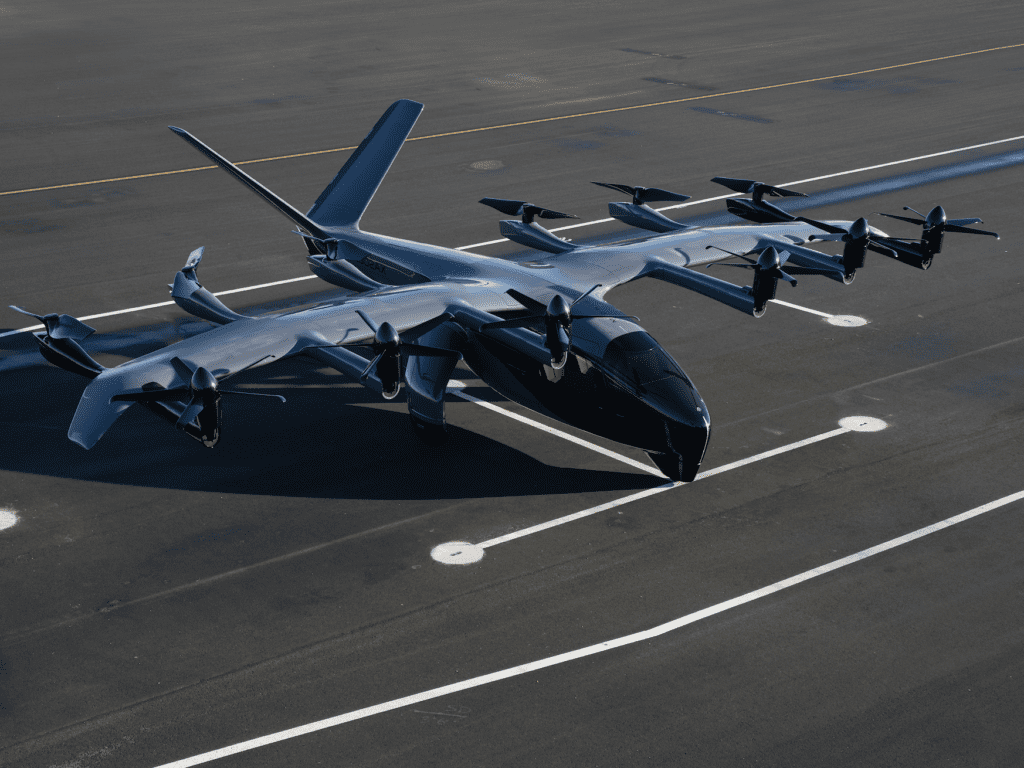
Archer Aviation has publicly unveiled its production aircraft, Midnight. The Midnight eVTOL aircraft is the evolution of the demonstrator aircraft, Maker. (Photo: Archer)
Archer Aviation revealed its production aircraft, Midnight, to the public today following its Open House event in Palo Alto on Nov. 16. The company previously developed a demonstrator aircraft, called Maker, to test out the configuration and functionality of its electric vertical take-off and landing (eVTOL) concept. The team at Archer expects to certify Midnight with the Federal Aviation Administration towards the end of 2024.
“We built, tested, and flew Maker as a testbed to advance our process with the FAA,” Archer’s CEO and founder, Adam Goldstein, shared in an interview with Avionics International. “We validated a lot of our technology; we validated the configuration, the tiltrotor, and the flight controls. It gave us confidence in the technology and helped set a lot of the frameworks with the FAA that allowed us to get to where we are today—the building and unveiling of our production plane.”

Midnight keeps the same 12 tilt 6 configuration as the Maker testbed. “We’re still using a lot of those same philosophies that we validated with Maker,” said CEO Adam Goldstein. (Photo: Archer)
Midnight is designed with a 100-mile range. Archer’s strategy, however, focuses heavily on 20-mile back-to-back routes conducted in rapid succession. “A typical route would be airport to city center for passengers in and around urban environments,” Goldstein said.
Archer announced its first eVTOL route in partnership with United Airlines last week. The route will take passengers to and from Newark Airport and a heliport in downtown Manhattan. “That’s a really critical key hub for United, and it’s a route that a lot of people take every day,” remarked Goldstein.
For initial urban air mobility (UAM) operations, Archer will rely on existing infrastructure, such as the heliport in Manhattan that will be used for the route to and from Newark. “Over time, we will build more infrastructure or work with companies to build more infrastructure,” he noted.
The mayor of New York City, Eric Adams, “is very excited about the opportunity to bring a new sustainable form of low-noise transportation,” Goldstein commented. Los Angeles and Miami are two other cities of interest for UAM operations. He noted that the route between Miami and Fort Lauderdale in particular could be a viable option for introducing eVTOL flights.

Archer is first looking at launching routes in cities that are tech-forward, said CEO Adam Goldstein. “They want these solutions, and they want to bring in sustainable forms of transportation. Heavy congestion a really big part of it—where the airport to city center routes make a lot of sense.” (Photo: Archer)
Archer made several big announcements this week. On Monday, the company revealed plans to build its manufacturing facility near the Covington Municipal Airport in Georgia. This site is expected to have the capacity to produce as many as 650 eVTOL aircraft annually, kicking off initial production in the latter half of 2024.
The eVTOL developer entered into a new agreement, made public on Tuesday, with Garmin. Garmin will supply the G3000 integrated flight deck for Archer’s Midnight. “The compact and lightweight system offers both an extensive certification pedigree and the configurability needed for Archer to bring its aircraft to market,” according to the announcement, and “the large format displays and intuitive controls will provide pilots with the situational awareness needed to operate Midnight.”
And yesterday, Archer revealed its choice of a supplier for the battery cells that will power Midnight. E-One Moli Energy Corp., or Molicel, signed a memorandum of understanding to manufacture battery cells at scale that will help to enable a 1,000-pound payload for the aircraft. Molicel was also chosen as a supplier for another eVTOL aircraft developer, Vertical Aerospace, this summer.

The first reveal of Midnight’s interior (Photo: Archer)
In selecting suppliers, Archer uses a concept known as realistic innovation, Goldstein explained. “The focus is on commercialization, so we want to get to market, and we want to choose the lowest risk, most efficient path to do that,” he said.
“A lot of times, that means partnering with great suppliers and using off-the-shelf products that are already flying today on certified aircraft,” he added. “There are some parts where we have not found good enough alternatives that can help us meet our mission.” One of these parts is the powertrain for Midnight, which Archer’s team has been developing.
Archer’s team is focused, at least initially, on launching in the U.S., although they see a lot of opportunity to expand globally once the network in the U.S. is established.
When the first eVTOL developers launch operations, which will start in 2025, confidence in the new mode of transportation will start to grow—both from the public and from the investment community. “I think it will be a great experience for consumers and early adopters because they can take a product that is very convenient and affordable. It’s a new alternative to rideshare,” Goldstein said.